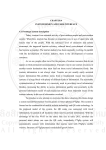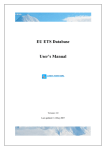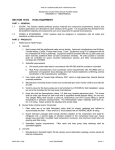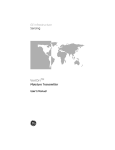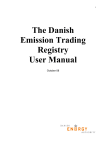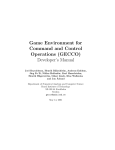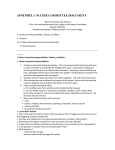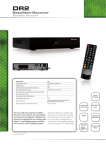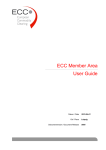Download September 2015
Transcript
September 2015 Issue 07 In This Issue API arrives to CMO.grexel! Say Hello to GECCO™ How to secure your CMO.grexel account Viewing Meter Readings in CMO.grexel gets easier Call for Economic Sustainability – European Renewable Energy Support Schemes and the Market The Guarantees of Origin Market and its expanding frontiers Residual Mix Calculation at the Heart of Reliable Electricity Disclosure in Europe Grexel Disclosure - Juri API arrives to CMO.grexel! Retrieving information and scheduling transactions via the API has already been available in the Norwegian registry (NECS), powered by Grexel. The users of the Norwegian API service agree that with the API, certificate management is much easier. The Bischoff & Ditze Energy GmbH has used NECS’s API service several times a month, and they say “The schedule API did already save some time for us, so this one is really a good one.” Grexel® is pleased to announce that it has developed an API functionality to CMO.grexel. API (Application Programming Interface) is an HTTP service that allows users to feed information into and retrieve information from the registry without using the system's web interface. This gives the user more power: you can now connect or integrate multiple functionalities together to create a more customized and powerful solution. API is an extra service in CMO.grexel that can be purchased either by the Issuing Body for the whole domain, or Grexel can provide it directly to individual Account Holders as an extra service. Why Get CMO.grexel API? Through API, Account Holder users can retrieve system information, as for example, account statements and certificates information. On top of this, they can also create and delete scheduled transactions (to occur within the next hour) without using the system’s user interface. The CMO.grexel API lets companies’ developers build applications that interact directly with our CMO.grexel servers. With these applications, time spent on certificate management can be significantly reduced. Access to CMO.grexel API is encrypted and uses client certificate based authentication. Next Steps: Ask for a quote and schedule a demonstration by sending an email to [email protected] Read API documentation available under Support menu in CMO.grexel 1 Say Hello to GECCO™ Grexel’s Environmental Commodity Clearing Office, GECCO™, is now open and running in CMO.grexel. GECCO is a banking service that streamlines the management of environmental assets. It enables account holders to keep and transact several kind of commodities, certificates, credits and allowances in a single system that is secure, easy to use, and affordable. For account holders, it means that they can deposit, cancel, withdraw, trade and retire different kinds of environmental products in the same registry. They can also get uniform cancellation statements and anti-double counting guarantees for different products, all publicly available. Environmental products include various kinds of certificates, allowances, green credits and tags, such as biogas certificates, Emission Reduction Units (ERUs), non-EECS certificates, among others. In order to make a deposit, the account holder just needs to be able to show valid evidence that the units represent unique proof of the underlying attributes. For issuing bodies, scheme authorities and independent auditors, the service enables production device/project registration as well as issuing of certificates for the units. They do no longer have to provide their own registry or database for their units, but can let account holders deposit the credits to GECCO under their (authority’s) accreditation and supervision. It is enough to agree the scheme specific deposit rules with Grexel. GECCO’s public reports ensure compliance with relevant environmental market standards. Learn more about the Products Covered or Contact us to join the Green Lizard’s Team! GO GREEN with GECCO™! More than ever, businesses are choosing to “go green”. As renewable energy consumption and carbon offsetting become the mainstream of companies’ sustainable strategies, so does the management of environmental assets such as energy certificates and carbon credits. At the same time, green businesses want to make sure that their environmental goals and their progress to achieve these goals are easily accessible to the public. We hope that GECCO™ can simplify environmental commodities management, be a secure place where all the green assets can reside and ultimately facilitate transparent reporting to interested parties thus helping corporate customers to demonstrate their commitment to a greener world. Taking the lead, Grexel had 31 units of CERs (Certified Emission Reductions) cancelled on its behalf to offset our 2014’s carbon footprint. The public cancellation statement is available in GECCO, here. Your business can also have its carbon credits retirements and green energy consumption statements in GECCO. It is simple to make GECCO the central place to demonstrate your environmental efforts. Contact us to learn how! 2 How to secure your account The security of our registries is a top priority to us. With global cybercrime incidents on the rise, it is extremely important that our registry users are well informed and take all the necessary steps to keep their accounts safe. Follow the tips below to keep your computer and identity safe. Access certificates are for individual use only! Protect your client certificate and password. Add extra password protection for your client certificate during certificate installation process (Learn How). After installing a client certificate, delete it permanently from your e-mail and the pin from your phone. Know your organization member code. This is an important piece of information that will help us to quickly identify your organization in case you need support. The member code can be found under My Page menu or in CMO.grexel public site under Info > Members. AH Root users should have a clear view of all authorized users under their organization. Keep the user information up to date and make sure they have valid access certificates. Lock users who no longer need access to CMO.grexel. When creating a new user (and external users), consider carefully what roles this new user should have. Allocate user roles to users strictly on a need basis. If some users do not need to make transactions, don’t give them Root or Account Administrator roles. Consider use of 4-eye approval for all external transactions. Review your Account Statements regularly Pay special attention to the security of mobile devices. They are easily lost or stolen. o If not needed, do not install client certificate to your mobile device o Encrypt the data in the mobile device o Use complex passcode, longer than 4 digit pin code o Configure remote wipe and find my phone and learn how to use them o Configure automatic wipe if wrong passcode entered e.g. 10 times. Brute forcing 4 digit pins only takes an hour. Your CMO.grexel account should be treated with equal amount of care and attention that you would give to any online banking account. Keep an eye open for strange activity and please report to Grexel immediately if you find anything suspicious. Grexel Aims to Excel in Information Security Management Grexel has always followed strict security policies in all its activities. But we find that it’s important to keep improving in order to address the constantly changing environment. By the end of 2015, Grexel aims to be certified with the ISO 27001. ISO/IEC 27001 is the best-known standard providing requirements for an information security management system. This way we can be globally recognized for the security of our development and database services. Viewing Meter Readings in CMO.grexel gets easier Grexel listened to customers’ requests and improved the Meter Reading report in CMO.grexel. Up to now, users could only see meter readings of one Production Device (PD) at a time. This meant that a lot of time was spend to gather information on PD’s meter readings. With the new View Meter Readings report, users can search for meter readings that belong to different PDs and that correspond to different search criteria specified by the user. The meter readings of one or more PDs are summarized in a nice looking report that can be easily exported to excel and PDF. The View Meter Reading Report can be found under Plants menu. Don’t forget to take a look at the user role table in the user manual to make sure that your user role has access to this new functionality. 3 Call for Economic Sustainability – European Renewable Energy Support Schemes and the Market By Martin Aalto* Europe, along with the rest of the world, is struggling towards a low-carbon society, where competitiveness, security of supply and sustainability are key priorities to provide a stable environment for decades to come. In the arena of renewable energy, Europe will soon reach its 2020 targets. Such achievement has mainly been due to national support mechanisms helping emerging clean technologies compete with conventional production units. Despite of its great accomplishments, the support schemes, lacking a common framework, have formed a very heterogeneous set of energy policies that are tightly constrained by national borders. As renewables are increasingly deployed to the soon-united electricity markets, previously unforeseen consequences begin to emerge and interfere with other market dynamics. Future energy frameworks will have to address these issues, along with other highlighted objectives stemming from current growth in policy costs and lack of harmonization. This article highlights changes in the energy field seen in the last years and suggests that a revision of the current state of support mechanisms for renewable energy should be put in motion. The field of energy is changing and it calls for a restructured support scheme The European renewable energy support framework, as a whole, is built upon partly outdated concepts of renewables. Current support mechanisms have proven very effective in lifting renewable technologies from marginal shares of production to the levels witnessed today. However, the same mechanisms are rapidly losing their advantage, most evidently in cost-efficiency, when more renewable capacity is introduced to the system. It can be argued, that an update of renewable energy support policy is required to respond to the strong changes recently experienced in the energy sector. Renewable energy is becoming common. In 2012, Europe reached a share of 23.5% of renewable energy in electricity generation. Higher rates of deployed capacity also lead to increased effect on the overall electricity market. The need to increasingly address arisen issues will also shift the focus of costs as more funding has to be allocated to maintaining grid and market balances. This, however, contradicts drastically with the current policy extrapolations that suggest a dear need for these funds in direct renewable support. “The European renewable energy support framework, as a whole, is built upon partly outdated concepts of renewables.” In addition to increased volumes in production, more mature renewable technologies will soon reach grid parities. Although the research shows that, even when fully competitive, renewables would need some support to overtake the market, the levels of remuneration should in some cases be considerably lower and set more flexibly. The updated support framework would also benefit from integrated market mechanisms in price setting and support allocation. True efficiency gains can only be expected if the support is fully exposed to market signals that would automatically guide the framework to use the most efficient route available. Finally, it should be taken into consideration that as European electricity markets are strongly integrated, it would be logical for the support mechanisms to also undergo a certain degree of harmonization. Current support schemes do not perform well under these new set of market requirements. Commonly used price-based mechanisms, like feed-in tariffs, are inherently not flexible enough to respond to market signals, leaving unnecessary space for windfall profit formation and for elevated support costs. In comparison, volume-based support mechanisms, like certificate-based quotas, would theoretically meet the requirements better if market size and system transparency would be kept sufficiently high. This statement can also be confirmed in practice by observing the performance indicators of the joint elcertificates support system between Sweden and Norway. Visioning the future of renewable energy support in Europe. The current state of renewable support in Europe is not sufficient to achieve any of the five objective scenarios (scenarios that share the goal for overall emissions mitigation but differ in means of pursuing this goal) proposed by the European Commission to reach its long term sustainability targets. The alternative mechanism would have to provide a European approach by allocating support more cost-efficiently across national borders, addressing the need for growing renewables to be exposed to more market 4 forces, taking into account the increased maturity of some renewable technologies, and providing a harmonized approach to cost and support allocation. Taking a fresh perspective in the renewable energy support, it is believed that a more international approach should be taken in supporting more mature renewable technologies. In more detail, it would require a multilateral market-based quota system – best achieved by introducing a European Tradable Green Certificate scheme based on the current institution and on the market of Guarantee of Origin. This system would lead to the most efficient allocation of available resources, provide sufficiently large and stable market to mitigate investment risk, and remove the channeling of support through government facilities by giving markets the power over the supply, demand and price of the certificates. The risk of uncontrolled remuneration growth due to poor volume predictability (as in price-based systems) would also be diminished. This alternative has already been proposed and discussed within the context of the previous legislative package proposals. However, the markets and renewable technologies were too immature at the time to create this kind of common system. Some of the predictions and estimations presented as parallel to previous support mechanism debate have also proved to be flawed. Time has passed, and more recent indicators of competitiveness, market penetration and resulting costs suggest that the time for this European transition has now come. * This article was based on the author’s Master Thesis: Call For Economic Sustainability – European Renewable energy Support Schemes and the Market (2014) Guarantees of Origin Market and its expanding frontiers Every year we get one step closer to harmonizing the GO market in Europe. Ireland, the newest domain in CMO.grexel, is also the newest country to join the EECS-GO market. The country’s Issuing Body, SEMO, became an AIB member last May. In the same month, AIB gained another member, CREG from Federal Belgium. Currently, there are 23 members from 20 different countries. In addition, here is a heads-up for what the future holds: according to the AIB1, more Issuing Bodies are expected to join the market in the near future: the Swedish Energy Agency2, the Spanish electricity regulator and the Greek TSO. Other possible newcomers are EMS from Serbia and Ofgem from the UK. 1 Source: AIB Newsletter no.23, Vol.8, Issue 1, 18 June 2015. 2 Sweden is already a member country (Grexel) 5 Residual Mix Calculation at the Heart of Reliable Electricity Disclosure in Europe - A Case Study on the Effect of the RE-DISS Project RE-DISS with Grexel as the main author, wrote an academic article on the effect of proper residual mix calculation for the reliability of electricity disclosure information in Europe. Quoting the article, “In order to be considered reliable, GOs require the support of an implicit disclosure system, a residual mix, which prevents once explicitly tracked attributes from being double counted in a default energy mix.” The paper highlights how, by addressing 5 major problems of implicit disclosure, 16 European countries have reduced double counting of renewable attributes by 70 TWh and total disclosure error by 168 TWh during the course of the RE-DISS project phase 1 (see graph). The article goes on to assess various methodologies used for residual mix calculation and underlines the problems of production-year based calculation in today’s system where GOs have a 12 months’ lifetime. Consumer empowerment has been a central part of energy regulator working programs, especially over the past years. GOs have the key role in this, as they literally give the power of choice to the customers, but to execute the power, customers need to trust in the reliability of the system. When part of a reliable disclosure system, GOs have the potential to: Give financial support to renewable energy producers Alleviate both financial and, more importantly, political burden of governmental support schemes for RES Give suppliers an effective mean of differentiation therefore supporting free electricity markets Enable a harmonized electricity tracking system in Europe. Enable operation of environmental labels for certain types of electricity production. Total quantified implicit disclosure errors per energy source before and after RE-DISS: 2010 (left-hand columns), 2012 (right-hand columns). Source: Energies For the above effects to happen, it is vital to ensure the reliability of the entire tracking system and thus, take into account also electricity that is not tracked with GOs and use the Residual Mix. If you’re interest in reading further about the methodology and development of the residual mix, as well as about the effects of the most prominent disclosure problems and their prevalence in various countries, please view the article here. Grexel Disclosure – Juri Juri is a project manager and system administrator at Grexel. He mainly works on green certificate registries. Juri says he is a developer by training and by heart. He actually has an economist background but, after finishing Economics school in 1989, he has ever since worked as a developer, consultant and system administrator in different areas including security systems and call centers. Juri He has been a part of certificate registry development almost from the start. He joined Grexel in 2002 when the team already had tentative technical specifications of a system to be developed. At the time, it was a completely new kind of system for little-known energy certificates, he remembers. He started as a developer facing the challenges of an unfamiliar system to be created. In the second stage of the same project, he became a project manager and system administrator. Juri says that this new phase has been challenging and he has his hands full. As the proverb goes “with great power comes great responsibility.” Juri is Estonian by citizenship, but he commutes between Estonia and Ukraine (the peaceful part of it, he notes) for family reasons. Taking into account this summer’s weather conditions for his Scandinavian co-workers, and as a bonus to the readers who had patience to read so far, he sends us all “warm and sunny wishes from hot Ukraine!” Follow us Grexel’s Newsletter [email protected] 6








